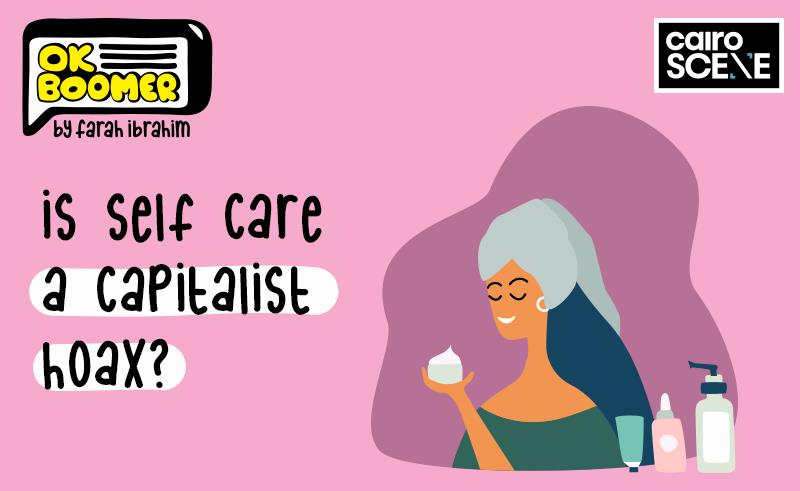OK Boomer: Is 'Self Care' a Capitalist Hoax?
Self care does not equal yet another facial moisturiser.

“Uh oh.” That was my first thought when one of my best friends, let’s call her Sarah, told me that she’d been feeling burnt out over the past few weeks. My immediate reaction was to ask a question: have you been making time for self-care lately? As soon as it slipped my tongue, I feared sounding pretentious, or worse, righteous. It seems like self-care has become yet another addition to our already crowded to-do lists— another item to cross off for the day or otherwise feel guilty that we don’t have it all ‘together’, whatever that means.
If you, like I, scroll through TikTok everyday, then you’ve seen countless videos of ‘it’ girls and boys waking up at 6 AM to do this very thing. First off, you’re meant to go for a run or do some yoga, then you shower and carry out some elaborate 10-step skincare routine, followed by breakfast (likely consisting of avocado toast, protein pancakes, or a smoothie bowl), after that you get to work until the evening and cap your day off with an equally healthy dinner— zucchini noodles. Most importantly, this all has to be done (and of course filmed) in an exquisite, aesthetically-pleasing setting. Is self-care really self-care if it isn’t pretty?
I think yes. In fact, I’d argue that in order for it to be real self-care, it almost has to be ugly. Ugly crying, unravelling, unlearning, and sometimes saying goodbye to people, situations, and habits we’ve grown attached to. I’ve used one too many bath bombs to know that taking care of myself doesn’t start at The Body Shop, and I think younger generations are starting to catch on, too. Over the last few years self-care has become a ‘thing’; its true meaning has been reinvented over and over by Millennials and has left Gen Z puzzled. When the term was first coined, it was done so by iconic American writer Audre Lorde. “Caring for myself is not self-indulgence, it is self-preservation, and that is an act of political warfare.” But why? Lorde was an outspoken feminist, and her notion of self-care was explicitly targeting activists, who she felt needed downtime in order to continue doing the good work that needed to be done. She wasn’t referring to 9 to 5 employees or people that have eaten one too many chocolate chip cookies. But does that mean that the modern (wo)man doesn’t need self-care? We do, but it's up to us to decide what self-care looks like.
If I may overshare, self-care for me has slowly, painfully, and sometimes forcibly taken the form of upholding my own personal boundaries. But first, I had to learn what those even were. For example, I’m not ashamed to admit I’m a pretty jealous person. I wasn’t always that way, but then life happened. Eventually, and with much embarrassment, I had to accept that while I recognised how harmful my jealousy is (and that it very much exists) it just wasn’t going anywhere. People don’t change, not really. What I could do, though, is learn to navigate my newfound boundaries. Don’t date people who make you feel insecure. Don’t put yourself in situations you know will make you vulnerable in that way. Don’t trigger yourself, Farah. It helped a lot. More than a face mask or bottomless brunch, that’s for sure. But self-care doesn’t have to look that way for everyone.
Maybe for someone who feels out of touch with their body and appearance, a face mask truly is in order. But for a fashion model, whose very job is to look beautiful around the clock, self-care could likely come in the form of a greasy cheeseburger. The point is, self-care has developed from self-preservation into yet another thing to commodify. Stressed out? Buy this eucalyptus nighttime body lotion. Need a surge of energy? Drink this turmeric orange booster shot. Now we’re still stressed, still tired, still have stretch marks, and we’re broke too.
Probably the biggest example of this is the ‘clean girl’ aesthetic. An off-duty model, the clean girl’s hair is slicked back into a sleek bun. Her skin is glowing with the retinoids she applies every night and the SPF 50+ she unfailingly lathers on every morning. At home, her closet is stuffed to the brim with neutral sweat sets, white Converse, and blazers of every colour. Somewhere along the way, we’ve collectively ditched the full-face makeup and high heels beauty standard and replaced it with something more natural and fresh. That’s not a bad thing, but its reliance on product hoarding insinuates that perfection is attainable if only we could buy the right shampoo. It also encourages people to enjoy the hedonic value of the products we buy; the pleasure derived from using it. It doesn’t matter if it actually works or not, it’s about the experience of applying it. I hate to say it (lol not really), but capitalism weaponizes self-care for profit. So instead, I’d like to offer up the belief that self-care could be better understood as inward learning, and as self-compassion.
Dr. Maria Baratta said it best in an article for Psychology Today: “Self care in essence is the mindful practice of taking time to pay attention to you, not in a narcissistic way, but in a way that ensures that you are being cared for by you.” In her view, self care means knowing who you are and what your limits are. Maybe you are a highly sensitive person prone to getting bothered by overstimulation. In realising that, you’re better able to recognise triggers when you see them. When you start paying attention to your own needs, you become more productive, less stressed, and more confident. So while products could help some people on the way, they’re merely a tool, and they aren’t integral to the process in any way. In accepting that, we’re able to give a proverbial middle finger to the powers that be who pressure us to cash out for some inner peace, and start focusing on the things that actually matter. You.
- Previous Article Sound of Noise’s ‘DAWASH 002’ Sheds Light on Cairo’s Experimentalists
- Next Article Sharm El Sheikh to Build Its First Solar Power Plant
























